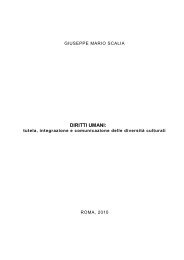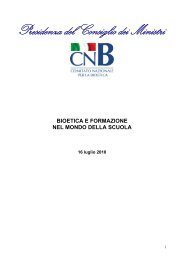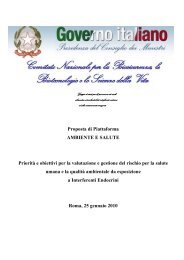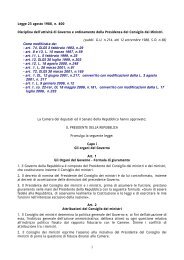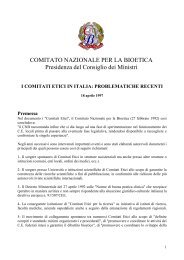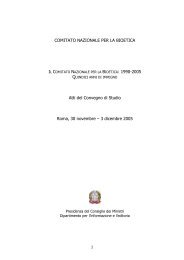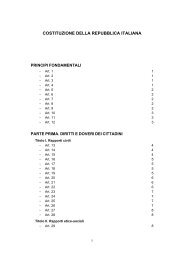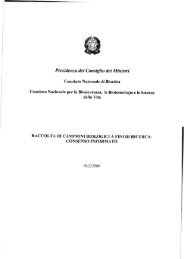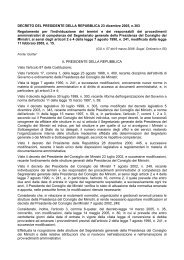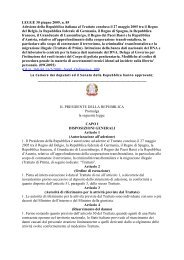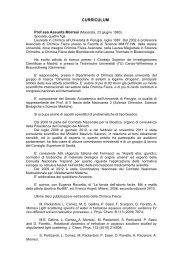President
President
President
You also want an ePaper? Increase the reach of your titles
YUMPU automatically turns print PDFs into web optimized ePapers that Google loves.
Premise: prison suicides in a bioethical perspective<br />
In its decision to deal with the problem of the high prison suicide rate, the<br />
National Bioethics Committee was moved by the concern for a phenomenon<br />
that is undoubtedly not new, but of such social and ethical importance as to<br />
deserve consideration, particularly at this moment in history: there was the fear<br />
that today’s serious hardships of prison life, owing to overcrowding, would have<br />
created the conditions for a fresh upsurge of the phenomenon.<br />
Unfortunately these fears have turned out to be justified, as 2009 set a<br />
negative record, with 72 suicides; in the first half of 2010, 32 inmates took their<br />
own lives and 44 attempted suicide.<br />
The Committee is aware of the structurally afflictive nature of the prison<br />
sentence and of the evident incompatibility of prison with a balanced<br />
development of the person. Suicide is only one aspect of the wider and more<br />
complex identity crisis that prison brings about, as it alters relationships and<br />
relations, breaks up existential prospects and weakens projects and hopes.<br />
The clearest and most radical way to eliminate all these hardships would be<br />
that of an overall rethinking of the function of punishment and the role of the<br />
prison sentence. For some time now there has been talk of a criminal law crisis<br />
as a result of the increasingly widespread belief that punishment by means of<br />
the privation of freedom is today anachronistic and, in many of its aspects, in<br />
contrast with the rule of law and the respect of the psycho-physical integrity of<br />
the person. Prison Law arose from the need to guarantee prisoners the respect<br />
of those fundamental rights that are reduced, if not denied, by the conditions in<br />
which they are forced to live, seeking to avoid the afflictive elements precluding<br />
any future prospect of reintegration.<br />
The sitting began with a consideration of the very nature of prison, thus<br />
going immediately to the heart of the problem. If the Enlightenment had<br />
succeeded in putting an end to the centuries old tradition of corporal<br />
punishment, one cannot see why our century should not question prison<br />
sentences. As much as this proposal arouses considerable ethical interest,<br />
the NBC considered it more opportune not to deal with this document in the<br />
debate on the function of the prison sentence, but to highlight those aspects<br />
that could make it possible, remaining within the present institutional<br />
framework, to reduce suffering and to pay greater attention to particularly<br />
vulnerable subjects like those serving a prison sentence.<br />
Considering that the sphere of competence of bioethics is marked by the<br />
‘life sciences and the treatment of health’, then it is its duty to bring the sectors<br />
to notice in which there exists a condition of hardship and crisis in relational<br />
and healthcare prospects, highlighting the social and political conditions fuelling<br />
them and proposing, at the same time, specific remedies and solutions. As the<br />
NBC points out in the introduction to the document on adolescent suicides, the<br />
concepts of the identity/subjectivity of the person in the juridical ethical sense<br />
and of society constitute inalienable points of reference that substantiate the<br />
bioethical debate 252 . There is an institutional and an individual profile in every<br />
bioethical problem. One does not exclude the other, but they present different<br />
features that allow them to be treated separately. In this document priority is<br />
given to the individual aspect, the improvement of the single aspects of prison<br />
252 NBC opinion “Youth suicide as a bioethical problem”, 17 July 1998<br />
190



